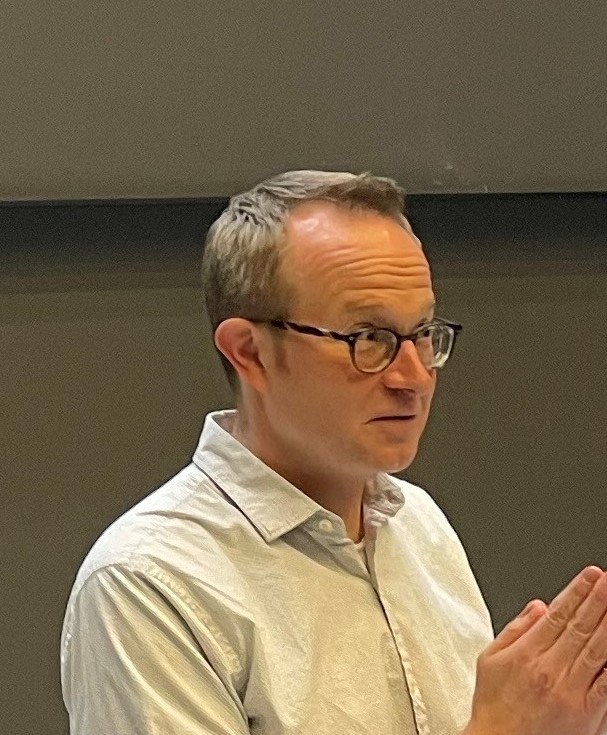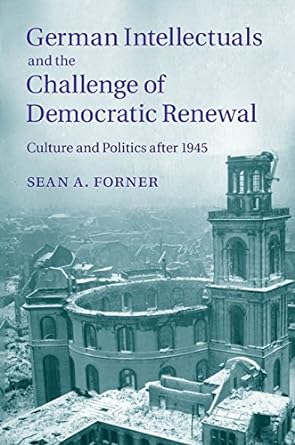
Office: Old Horticulture 116
Office Hours: (on leave 2023-24)
Email: saforner@msu.edu
Phone: (517) 884-4868
Position: Associate Professor of History &
Core Faculty, Center for European, Russian, and Eurasian Studies
Field: 20th Century, Contemporary, Cultural, Intellectual
Region: Europe & Russia

I am a historian of 20th-century Europe and Germany interested in intersections of intellectual history and political culture, or social and political imaginaries. My primary focus is on ideas and practices of democracy after the World Wars, especially in moments of destabilization and experimentation (e.g., around 1945, 1956, 1968, 1989). I have also written on memory and representation and issues of method and theory. My teaching ranges from lower-level and general-education courses on the European Union, 1920s Germany, and comparative revolutions to upper-level courses on 20th-century Europe, the First World War, and intellectual history to a graduate seminar on social theory and historiography.
My first book examines the rethinking of democracy in postwar, post-Nazi Germany. Its focus is a loose, ideologically plural network of public intellectuals and the fundamentally participatory, distinctively German vision of democratic renewal they formulated in the immediate postwar years. Paradoxically, this project emerged among intellectual elites but sought to revise the conventional elitisms of modern politics. It ran aground on its own internal tensions and on the upsurging Cold War, but it infused undercurrents of dissent that helped shape later decades.
My current project explores the emergence of Europe’s “first New Left” in the 1950s and its later legacies. Increasingly after mid-decade, clusters of intellectuals at sites across Europe came together around a shared discontent with the technocratic character of the postwar world and a shared desire to revitalize socialism in a “humanist” vein, with democratic intent. What made similar ideas plausible at the same time but in disparate places? What role did trans-local and cross-border contacts play? Geographically, my cases range from West and East Germany to Italy, France, and Britain, with excursions to East-Central Europe and Yugoslavia. In terms of method, I aim to sound out an approach that avoids the double pitfalls of free-floating idealism and reductive materialism – a “post-idealist” intellectual history.
I received my B.A. from Stanford University and my Ph.D. from the University of Chicago. I came to MSU in 2007, after teaching at the University of Wisconsin-Milwaukee. I have held visiting fellowships at the Free University of Berlin, the Humboldt University of Berlin, the University of Cologne, and the Chemnitz University of Technology. My research has received support from sources including the American Philosophical Society, Alexander von Humboldt Foundation, German Academic Exchange Service (DAAD), Volkswagen and Mellon Foundations, SSRC Berlin Program, Fulbright US Student Program, and Javits Fellowship Program (US Dept. of Ed.).
Current Project
The Political Imaginary of Europe’s “First New Left”; or, High Modernism and its Discontents
Book
German Intellectuals and the Challenge of Democratic Renewal: Culture and Politics after 1945 (Cambridge University Press, 2014; paperback 2017)
(Listen to a podcast interview about the book at New Books in History.)
Articles/Chapters
“Intellectuals and the People: Conversation Forums and West German Democracy in the 1950s.” In The Arts of Democratization: Styling Political Sensibilities in Postwar West Germany, ed. Jennifer Kapczynski and Caroline Kita, 37-59. Ann Arbor: University of Michigan Press, 2022.
“Imaginary Intellectual History and ‘Managerialism’ in 1950s West Germany.” In Ideengeschichte heute: Traditionen und Perspektiven, ed. D. Timothy Goering, 69-94. Bielefeld: transcript, 2017.
“Reconsidering the ‘Unpolitical German’: Democratic Renewal and the Politics of Culture in Occupied Germany.” German History 32, no. 1 (2014): 53-78.
“The Promise of Publicness: Intellectual Elites and Participatory Politics in Postwar Heidelberg.” Modern Intellectual History 9, no. 3 (2012): 641-60.
“‘Deutscher Geist’ und demokratische Erneuerung: Kulturbünde in Ost und West nach 1945.” In Rückblickend in die Zukunft: Politische Öffentlichkeit und intellektuelle Positionen in Deutschland um 1950 und um 1930, ed. Alexander Gallus and Axel Schildt, 221-37. Göttingen: Wallstein, 2011.
“Für eine demokratische Erneuerung Deutschlands: Kommunikationsprozesse und Deutungsmuster engagierter Demokraten nach 1945.” Geschichte und Gesellschaft 33, no. 2 (2007): 228-57.
“‘Das Sprachrohr keiner Besatzungsmacht oder Partei’: Deutsche Publizisten, die Vereinigten Staaten und die demokratische Erneuerung in Westdeutschland, 1945-1949.” In Demokratiewunder: Transatlantische Mittler und die kulturelle Öffnung Westdeutschlands, 1945-1970, ed. Arnd Bauerkämper, Konrad H. Jarausch and Marcus M. Payk, 159-89. Göttingen: Vandenhoeck & Ruprecht, 2005.
“War Commemoration and the Republic in Crisis: Weimar Germany and the Neue Wache.” Central European History 35, no. 4 (2002): 513-49.
Conference Organizing
Democracy and Europe’s 20th Century: Cultural and Intellectual Histories: An International Workshop, Humboldt-Universität zu Berlin, May 10-11, 2013
Courses Taught at MSU
IAH 221C. Inventing and Imagining Society
ISS 325. Revolutions and the Modern World
HST 110. European Union: History of an Ongoing Project
HST 201. Methods and Skills: Weimar Germany: Politics, Culture, Modernity
HST 206. Europe since 1500
HST 336. Europe from Bismarck to Brexit
HST 338. Power, Culture, and Thought in Modern Europe
HST 387. The First World War
HST 483. Seminar: Intellectuals and Politics in 20th-Century Europe
HST 814. Seminar: Historiography and Social Theory
HST 850. Seminar: Intellectual History: Readings and Approaches